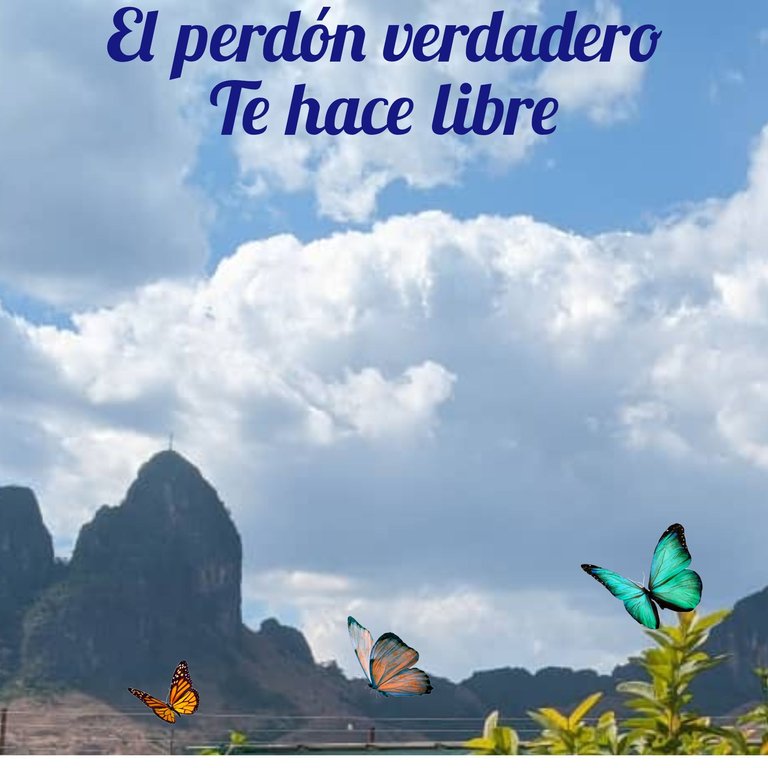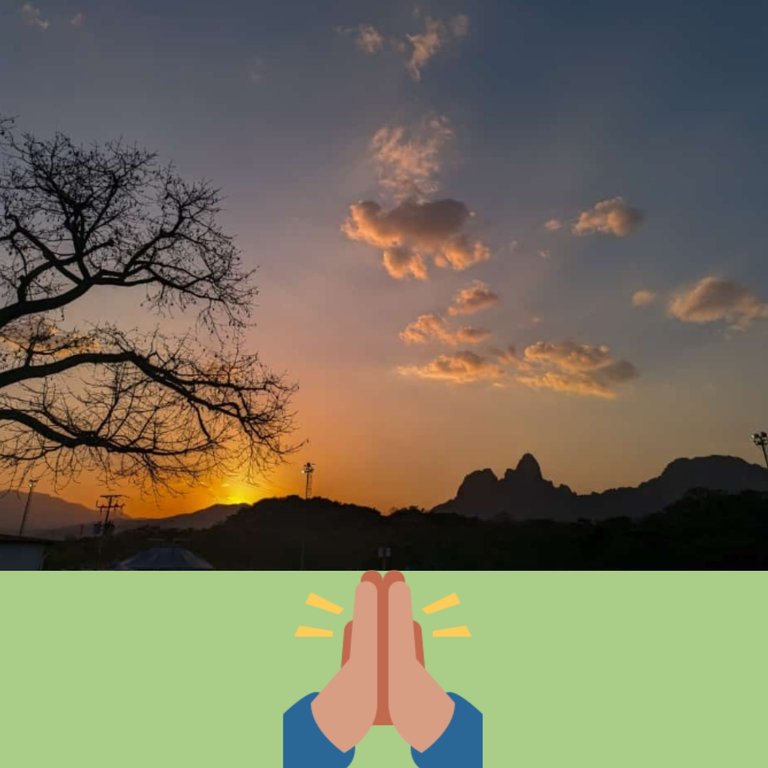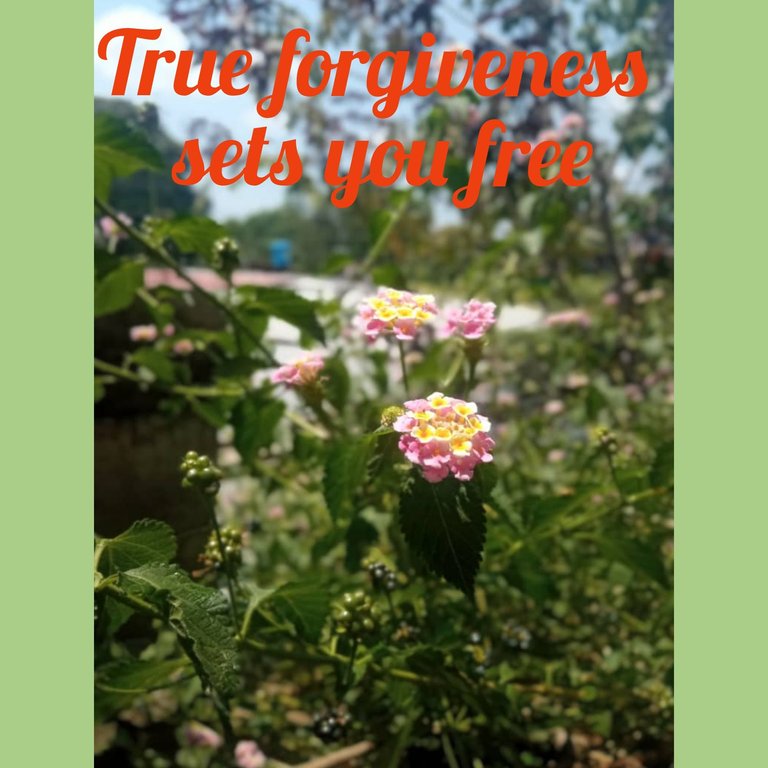El perdón verdadero te hace libre//True forgiveness sets you free.

Saludos comunidad de @Holos y en especial a @rosahidalgo por traernos este maravilloso contenido, iniciativa que lleva por título “La maravilla del perdón”
https://peakd.com/hive-131951/@rosahidalgo/la-maravilla-del-perdon-the-wonder-of-forgiveness
Por deducciones propias y análisis de un vivo errante, he llegado a la hipótesis de que la tan criticada imperfección es y ha sido una de las maravillas del ser humano.
Por esta analogía algunos compañeros y familiares me han dicho ocioso, y hasta en forma de juego me han dicho loco, y honor que me hacen, jajajajaja. En el mundo de locos el normal es considerado loco.
La imperfección nos da la oportunidad de aprender y buscar la anhelada idealidad o el perfeccionismo, todo gracias a cada error cometido, vamos aprendiendo, si así lo deseamos, de una forma muy característica y es lo que llamamos aprendiendo por ensayo y error, después de una caída o un tropiezo, nos levantamos y seguimos adelante con una nueva lección de vida.
Y cuando cometemos errores, como dañar emocionalmente a otra persona o a la fauna y flora, estamos dañandonos nosotros mismos y es aquí donde entra la otra maravilla que llamamos perdón.
En estás deducciones cotidianas, he determinado que de forma general existen dos tipos de perdón, sobre esto les quiero exponer mi participación.
El perdón cultural.
Lo llamo cultural porque es el tipo de perdón que nos vienen enseñando de forma religiosa de generación en generación.

Desde que somos unos niños nos inculcan la palabra y la acción superficial del perdón, “perdona a tu hermanito, a tu amiguito” o “ pide perdón que no está bien lo has hecho” y de forma general nos dicen perdona a tu prójimo.
Religiosamente existe un “padre nuestro” donde se dice “perdona nuestras ofensas así como nosotros perdonamos a los que nos ofenden” y vamos aprendiendo solo la palabra pero no la acción y qué decir del significado, pero no nos enseñan a perdonarnos.
Este tipo de perdón cultural es visto por mí como irreal, solo se usa lo literal y aveces hasta gesticulamos y nos arrodillamos para solicitar el perdón, irreal porque el que lo pide lo hace sin arrepentimiento o por lo menos por empatía y el que lo da lo hace de forma inmediata sin un proceso de aceptación de que él mismo es parte de esa falla, porque somos responsables de lo que nos hiere, somos responsables de permitir a otro entrar y causarnos dolor, rabia, rencor y decepción
El perdón real y liberador.
Este perdón es poco común y más complicado, pero es el más maravilloso.
Digo que es complicado porque no se enseña en el hogar, la escuela y academias y normalmente se aprende con el pasar de los años y las experiencias, y lo práctica un bajo porcentaje de personas, lo digo por mis observaciones, no por ser un estadista.
Lo hace real el hecho de que para perdonar debemos aprender a perdonarnos nosotros mismos antes de dar perdón, es real porque no es necesario que te lo pidan, ya cuando tú te perdonas puedes perdonar sin necesidad de que te soliciten el perdón.
Es liberador porque al perdonarte sueltas ese rencor que te envenena y te consume, sanas ese dolor que no te da paz, ya no sientes ira al recordar lo sucedido, puedes ver a esa otra persona a los ojos y no sentir miedo o ira y hasta se desvanece ese sentimiento de venganza.
La clave está en el auto perdón, parto de la premisa de que no puedes dar lo que no tienes, así que primero debo perdonarme yo para poder lograr conceder perdón.
Antes de finalizar quisiera aclarar que el hecho de perdonar y soltar no quiere decir que voy a borrar lo ocurrido, pero si me permite aprender y estar mejor preparado emocionalmente frente a próximas circunstancias parecidas.
Gracias por ser y estar, por pasar y leer.
Todas las imágenes son tomadas del álbum familiar y editadas con GridArt
English Version
True forgiveness sets you free.

Greetings @Holos community and especially to @rosahidalgo for bringing us this wonderful content, an initiative titled “The wonder of forgiveness”
https://peakd.com/hive-131951/@rosahidalgo/la-maravilla-del-perdon-the-wonder-of-forgiveness
Through my own deductions and analysis of a lively worker, I have come to the hypothesis that the much criticized imperfection is and has been one of the wonders of the human being.
Because of this analogy, some colleagues and family have called me idle, and even in a playful way they have called me crazy, and they do me honor, hahahahaha. In the crazy world, the normal person is considered crazy.
Imperfection gives us the opportunity to learn and seek the desired ideality or perfectionism, all thanks to each mistake made, we learn, if we wish, in a very characteristic way and this is what we call learning by trial and error, after a fall or a stumble, we get up and move forward with a new life lesson.
And when we make mistakes, such as emotionally harming another person or the fauna and flora, we are harming ourselves and this is where the other wonder that we call forgiveness comes in.
In these daily deductions, I have determined that in general there are two types of forgiveness, about this I want to explain my participation.
Cultural forgiveness.
I call it cultural because it is the type of forgiveness that we have been taught religiously from generation to generation.

Since we are children, they instill in us the word and the superficial action of forgiveness, “forgive your little brother, your little friend” or “ask for forgiveness because you have done it wrong” and in a general way they tell us forgive your neighbor.
Religiously there is an “our father” where it is said “forgive us our offenses just as we forgive those who offend us” and we are learning only the word but not the action and what to say about the meaning, but they do not teach us to forgive ourselves.
This type of cultural forgiveness is seen by me as unreal, only the literal is used and sometimes we even gesture and kneel to request forgiveness, unreal because the one who asks for it does so without regret or at least out of empathy and the one who gives it He does it immediately without a process of acceptance that he himself is part of that failure, because we are responsible for what hurts us, we are responsible for allowing another to enter and cause us pain, anger, resentment and disappointment.
Real and liberating forgiveness.
This forgiveness is rare and more complicated, but it is the most wonderful.
I say that it is complicated because it is not taught at home, in school and academies and it is normally learned over the years and experiences, and it is practiced by a low percentage of people. I say this from my observations, not because I am a statesman. .
What makes it real is the fact that to forgive we must learn to forgive ourselves before giving forgiveness, it is real because it is not necessary for them to ask you for it, since when you forgive yourself you can forgive without needing to be asked for forgiveness.
It is liberating because by forgiving yourself you let go of that resentment that poisons and consumes you, you heal that pain that does not give you peace, you no longer feel anger when remembering what happened, you can look that other person in the eyes and not feel fear or anger and even That feeling of revenge fades.
The key is in self-forgiveness, I start from the premise that you cannot give what you do not have, so first I must forgive myself in order to be able to grant forgiveness.
Before finishing, I would like to clarify that the fact of forgiving and letting go does not mean that I am going to erase what happened, but it does allow me to learn and be better emotionally prepared in the face of similar upcoming circumstances
Thank you for being and being there, for stopping by and reading.
All images are taken from the family album and edited with GridArt
0
0
0.000
0 comments